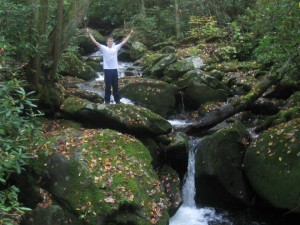Among the variety of nontraditional students at UR is a special group of individuals that opt to begin their college career during the second semester of the academic year. This year, UR granted fall admission to 5,824 applicants and offered 108 students spring spots. Of these 108, 48 students chose to enroll and have since been adopted into the University community. Eighteen of these students are freshmen and 30 are transfers. A “January Admit” may spend their free semester in a variety of ways; below, two midyear freshmen share their stories.
Angela Kluzniak
Starting college is a difficult process. There are people to meet, friends to make, dorms to move into and clubs to join. Some students even have the additional trouble of shipping their belongings and catching flights to Rochester. Like any other new social setting, each student is struggling to find the place they fit in. It is hard for some and easy for others, but they all find where they fit because there is a large group of people that are going through the same struggle.
Along with a small number of other students, I did not start this fall but as a January Admit. I didn’t know that this was even possible until I received my admission letter. I read the lines “after careful review of your application, I have concluded that I can invite you to enroll in January 2014.” Immediately, I thought it was a joke. I thought maybe I had mistakenly checked a box on my common app saying that I was applying for the spring term.
I called the school and learned that I had not made a mistake, but simply just that the school couldn’t take in all the students they wanted to for the fall term. The University offers the students spots in the spring when they will have more living space on campus.
When I was finished with the call I was confused and conflicted. I didn’t like the idea of being idle for such a long time. Because of this, I almost considered picking a different school where I would start on time. That was, until I re-read my admission letter. There are actually quite a few ways January Admits can fill their fall semester, but only one choice stood out to me.
“One option exclusive for Rochester-guided students is to start your college career in Arezzo, Italy.” I had never heard of a study abroad program that allowed freshman to participate, but I was immediately interested. I inquired about the program, filled out the forms, got accepted, and a few short months later found myself on the long flight to Florence, Italy.
I will never regret accepting my spring spot at UR because it provided me with an excellent opportunity to do something unique and exciting. The Arezzo program was wonderful because I was able to meet a very diverse group of UR students and get a good look at what it is like to study as a college student. The program was composed of five intensive classes; Ancient Structures, Cultural History, Art History, Italian language and Culture in Context.
I was able to learn a lot from those classes, but I learned the most outside the classroom. I learned how to be independent. I was able to decide when I got up, when I left for class, how much I studied, and what I did in my free time. I know it is typical for students who are living away from home to find this independence – the difference was that I had to do these things in a completely different culture.
I had to learn the culture around me so that I could perform my daily tasks. I had to be able to speak the language so that I could communicate. I could not use my family as a crutch because of the eight-hour time difference, as well as the fact that it was impossible to teach my parents to use Skype. Because of all these things, I gained a lot of self-confidence that I can now apply to my time at UR.
Starting in the spring is different than starting in the fall, but not worse. The orientation is a lot shorter, but the orientation leaders are just as kind and helpful. It is more difficult to make friends now that all the other freshmen have figured out where they belong, but it is not impossible thanks to the long list of people who are there to support the January Admits. I know that I have the support of the school, other admits, my freshman class, and the other students I went abroad with. College may be more complicated because I am a January Admit, but I wouldn’t have done it differently.
Kluzniak is a member of the class of 2017.
Zack Ely
 Starting college in the spring term offered a lot of advantages and opportunities that would otherwise have been unavailable to me. For starters, a two to three month summer really isn’t that much time. The first post-high school summer is often spent engaging in as many social endeavors as possible. It’s completely understandable – your closest friends are about to split paths with you as they head to their respective colleges. It makes sense that you’d want to spend that time with your friends, but it also leaves you less time to seriously prepare for the transition to college.
Starting college in the spring term offered a lot of advantages and opportunities that would otherwise have been unavailable to me. For starters, a two to three month summer really isn’t that much time. The first post-high school summer is often spent engaging in as many social endeavors as possible. It’s completely understandable – your closest friends are about to split paths with you as they head to their respective colleges. It makes sense that you’d want to spend that time with your friends, but it also leaves you less time to seriously prepare for the transition to college.
Last May, I finished high school and had seven months of free time on my hands. I knew that this period of time could either be crucial or detrimental to my future college success. With that burden in mind, I chose to take some time and write out all of the things I wanted to do with my life. I had a lot of time to accomplish several projects, but even so, I could never have accomplished everything I wrote down. So I took more time to restructure my list, and I finally managed to narrow it down to a few, accomplishable projects: volunteering at the local zoo, preparing for the new challenges coming in college academics, working a job, and taking some time to travel and reflect. With my plans sketched out, I prepared myself to enjoy summer and work hard.
My summer was typical. I had a lot of fun spending time with my high school friends. Once summer ended, though, I got to work. I picked up a second job, trained to be a volunteer at the zoo, bought some books about winning at college, and started planning a camping trip with a close friend. The air of summer left with the changing of the season, but the feel-good attitude stuck around. With so much time on my hands, any typical precollege nerves dissipated, and I managed to focus on my work without any added pressure.
My time at the zoo was extremely valuable. Not only was I able to add volunteer hours to my resume, but I also had the pleasure of being around fascinating, exotic animals. The atmosphere at the zoo contributed to my satisfaction. The thing I learned about zoos is that they work in a collaborative industry. Everybody at the zoo and all of the affiliates were there because they supported the conservation of the world’s most interesting creatures and their environments. From my time at the zoo, I received valuable experience, worked with great people, and contributed to something I care about.
Something all college students learn quickly is that the academics at UR are NOTHING like high school. Research papers are more challenging and frequent, exams more important, and homework more time-consuming. Many of my college friends warned me of this, so I decided to prepare for it. I bought books about time-management, college writing, and general success. With four extra months to read all of these books, I was able to more thoroughly prepare for the challenges of college than my peers starting in the fall.
One of my most rewarding pre-college experiences was hiking the Appalachian Trail. With months of planning and prep behind us, my friend and I set out on the trail in mid-October. We hiked ten-plus miles every day through rain, fog, and steep mountain terrain. Each day came with different challenges and rewards. We talked with interesting hikers, saw beautiful sights, and had a great life experience. We saw beauty on a micro level with the swaying of the trees, the activities of the woodland animals, and the songs of the birds. We experienced it on a macro level with the roar of powerful waterfalls, the incomprehensibly expansive mountain ranges, and the collective scent of pine, water, and mountain. By the end, we could say that we had hiked to the peak of the highest mountain in Tennessee, but that meant relatively little. The true value of this experience was the rejuvenation – we both felt stronger and more self-aware at the end of trip. I will never forget that experience.
One distinct unexpected advantage I’ve noticed in my brief time at UR is my easy transition. While starting in the spring may sound like a harder transition, it actually isn’t. The advantage is that everyone knows everything. In the fall, if you stop to ask a question, you’re likely to be talking to a fellow freshman who knows as little as you do. In the spring, however, almost everyone can answer your questions. The great work of the orientation staff and the kind atmosphere of the campus community made the transition easy. Upon starting the semester, I immediately felt like part of the University. Considering all of my experiences and the smoothness of my transition, I appraise starting in the spring as one of my best decisions of 2013.
Ely is a member of the class of 2017.






